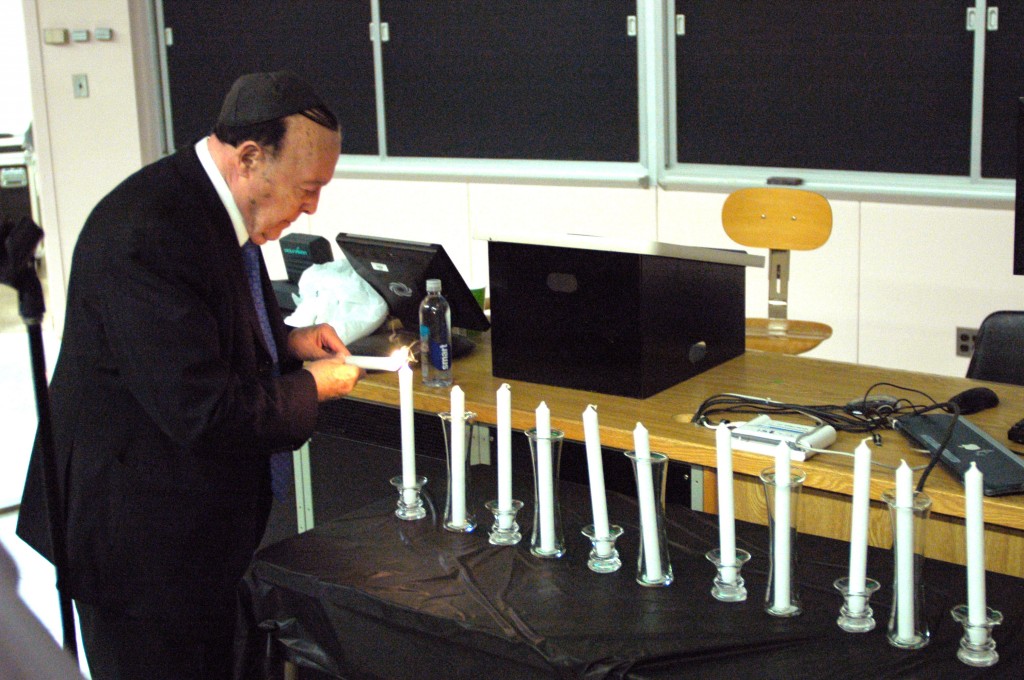
Rabbi Jacob Jungreis, a Hungarian Holocaust survivor, spoke Sunday and Monday to students, faculty, administrators and members of the local Jewish community in honor of Yom HaShoah, Holocaust and Heroism Remembrance Day.
Jungreis described his experiences as a Jew in Hungary in 1944, when he and his family had heard of the atrocities being committed against Jews elsewhere in Europe. According to Jungreis, his family housed around 50 Jewish refugees a night in order to smuggle them into Yugoslavia, where they had the chance of getting out of Europe and surviving the war. Yet Jungreis said that he and his family never believed the war would come to Hungary, the last country to be invaded by Germany.
“We just couldn’t believe that this was going on,” he said. “Hungary and Germany were partners, we assumed it cannot possibly happen in Hungary. And it did. Exactly 70 years ago.”
Jungreis addressed a nearly full Lecture Hall 14 Sunday night, and a smaller group Monday for a question-and-answer session. He told stories of his time in the ghetto when he was 11 years old, and then his deportation to Bergen-Belsen, where he stayed for seven months. Jungreis was a part of a group of 1,800 Jews who were not liberated from concentration camps, but ransomed. Rudolf Kastner, a Hungarian lawyer, negotiated the release of 1,800 Jews in exchange for $5 million.
In the ghetto, Jungreis said that his father, the local rabbi, would receive fake letters from community members who had been kidnapped or deported. The letters, which the Nazis had forced them to write before they were murdered, were always cheerful and positive, saying that the victim would be home after he had learned how to work with his hands.
“They would take away somebody, deport somebody or kidnap somebody before the official deportations started. We had no idea what happened to the people in our city, they were taking people every day,” he said.
Jungreis comes from a family of rabbis. He said that the trauma of his situation made him not think about faith explicitly during his time in the concentration camp or ghetto, but it still stayed with him.
“We did not think that we would survive, it’s like a shock, we were dumbfounded. We were absolutely certain that we are not getting out alive, however, we did practice our religion.”
The Nazis woke the concentration camp up at 5 a.m. and kept them outside until 8 a.m. Jungreis said shacharit — Jewish daily morning prayers — each day as the Nazis counted him and his comrades.
“We never abandoned God, and in the end, God did not abandon us either,” he said.
Jungreis spoke a lot about his passionate love for the state of Israel. He said that if someone had told him in Bergen-Belsen that there would one day be a Jewish state, he would have told them that they were simply hallucinating from hunger. According to Jungreis, the maintenance and defense of a Jewish state is the most important cause for modern Jews in order to ensure that nothing as tragic as the Holocaust can happen again.
“The boys who went to the gas chambers were just as strong as the boys who stood up in 1948 [Israeli independence],” he said. “It is just that we are like sheep, and when God wants, the sheep become lions.”
Jungreis’ speech Sunday night was part of a Yom HaShoah service organized by Hillel at Binghamton. The service, which predominantly featured Jungreis’ remarks, also included songs from Kaskeset, prayers from local rabbis and a candle-lighting ceremony. Eleven candles, representing the 11 million people who died in the Holocaust, were lit by different people from campus and the community. President Harvey Stenger lit a candle on behalf of Binghamton University, an experience he said he found meaningful.
“I feel humbled to be asked,” Stenger said.
As a part of Holocaust remembrance observance on campus, 75 people signed up to read the names of the Nazis’ victims for 25 straight hours outside of the New University Union. Josh Jurysta, the director of pluralism and education for Hillel as well as the president-elect, read names at 2 a.m. and 4 a.m. Monday morning.
“My grandfather was a Holocaust survivor, so it’s almost a subconscious duty in a way to remember those who were lost and commemorate them,” said Jurysta, a junior double-majoring in history and economics.
Also outside of the New Union was a Holocaust memorial constructed by Engineers Without Borders. The memorial was an enclosed wooden hallway that was painted black inside with a mirror at the end. People could write on the inside of the walls with silver and gold markers to share inspirational or meaningful ideas and prayers. The memorial was the idea of the Andrew Davidov, co-head chair of the events, who said that he wanted the memorial to represent the darkness and solitude of the Holocaust, as well as the possibility of reflection and redemption.
“I wanted to build a living, breathing memorial that people could walk through and be a part of,” said Davidov, a senior majoring in English. “I wanted people to be a part of something bigger than themselves, and have something to reflect and remember and touch and feel everything around them.”


